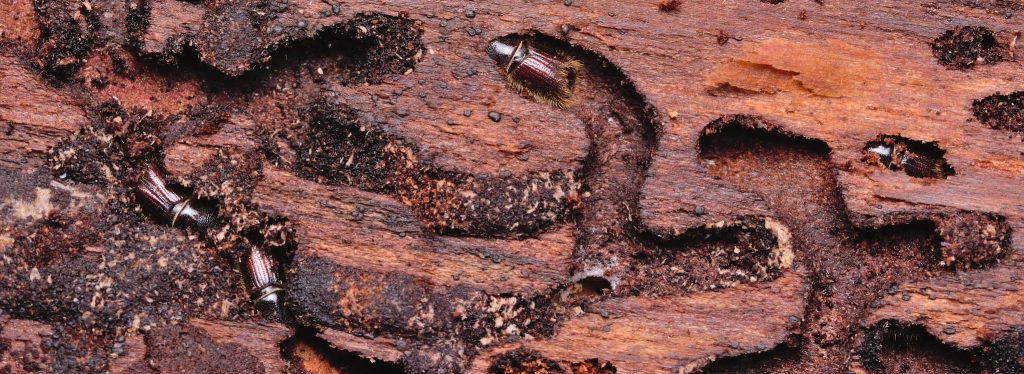
We do not have open positions right now BUT if you are interested please get in touch! There are plenty of possibilities to get founding and we have a lot of data to crunch.
krystyna.nadachowska @ uj.edu.pl
About the project (an OLD add!)
A major goal in evolutionary biology is to understand which processes shape genetic diversity observed in natural populations. Classic population genetic theory provides a solid mathematical framework to study genetic variation and predict efficacy of natural selection relative to drift in equilibrium conditions, for example under constant population size. However, the majority of natural populations often experience large size fluctuations that make prediction less straightforward. The main purpose of this project is to test how extreme fluctuations in population size of outbreaking species affect the dynamics of neutral and adaptive genetic variation. Many pests experience epidemic outbreaks characterized by sudden changes in population size, often spanning orders of magnitude. Such outbreaks are known from ecological studies of closely monitored species of economic importance. However, little is known about how genetic variation changes during outbreak cycles. Specifically, the rate of adaptive evolution during relatively short periods of large population size remains unknown. This can be studied in species which experience extreme fluctuations of population size, such as spruce bark beetle (Ips typographus).


Spruce bark beetle is the most destructive pest of Norway spruce forests because under specific conditions (e.g. storms) populations may outbreak, causing mass mortalities of spruce stands. We will compare populations of spruce bark beetle that have experienced frequent, recent outbreaks and populations that did not experience outbreaks in the recent past. By combining existing knowledge on biology and ecology of the species with newly generated, large-scale genomic data, we will address specific questions about the relationship between genome-wide variation and fluctuating effective population size: How outbreaks affect species genetic structure? Are adaptations in frequently outbreaking populations mainly driven by soft sweeps? How demographic history of the spruce bark beetle and historical fluctuations of effective population size over time affect current patterns of neutral and adaptive variation and more.
About the data
The PhD student will be working with large, whole genome resequencing data obtained from several populations and >500 individuals (short and long read sequencing). The PhD student will investigate selection patterns along the spruce bark beetle and among outbreaking and non-outbreaking populations. The analysis will include standard selection scans as well novel approaches to detect and distinguish between hard and soft sweeps. The PhD student will gain a wide range of scientific experience including genome-wide sequence data analysis as well as wet lab practice and will be encouraged to develop his/hers own projects using extensive datasets available.


About the place and salary
The Student will be based at one of the top research institutes in the fields of Ecology and Evolution in Central Europe – Institute of Environmental Sciences, Jagiellonian University, Krakow, Poland (www.eko.uj.edu.pl/en_GB). Krakow is a beautiful city with a dynamic cultural life (European City of Culture 2000; more than 100 festivals and other events organized every year; modern museums, cinemas, theaters, restaurants etc). It has good access to outdoor activities (biking, hiking and more) and is well-connected to the rest of Europe. The PhD student will be supported by a 48-month, tax-free research stipend: 4500 PLN (~1000 EUR) per month. This stipend may be combined with the standard PhD program scholarship (for those that will pass the entrance exam to PhD graduate school at Institute of Environmental Sciences, approximately 2200 – 3500 PLN). Note that in Poland, the living costs are relatively low (check out a cost-of-living calculator such as www.numbeo.com) and even without additional funding from graduate school the salary is more than enough to fully enjoy life in Krakow.
Requirements
The successful candidate will have an M.Sc. degree in a relevant field by October 2021. We are looking for a student with strong interest in Evolution, Molecular Ecology, Population Genetics and/or Genomics as well as experience with, or a keen interest in learning, Bioinformatics and Computational Biology; and strong English language, communication, and organizational skills. Previous experience with population genetics, evolution, genetics, insects biology and evolution are advantageous.

If you are interested please send a cover letter explaining your background, skills, and interest in the project, a CV, and contact details of two academics who are willing to provide a reference, to Dr. Krystyna Nadachowska-Brzyska (krystyna.brzyska@gmail.com or krystyna.nadachowska@uj.edu.pl).
The review of applications is ongoing; please apply by 30th April 2021 to ensure full consideration. The selected candidate will be assisted with a formal application to the Ph.D. program at Jagiellonian University. The starting day for the position is 01.10.2021 (but can be negotiable!).